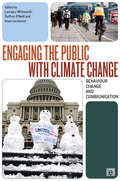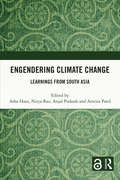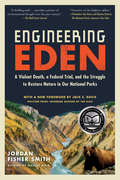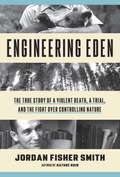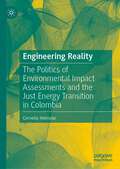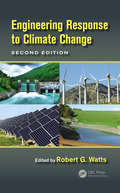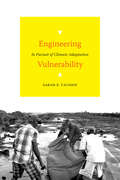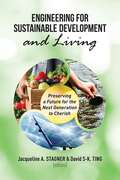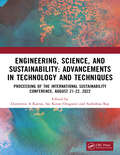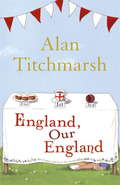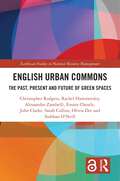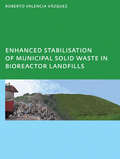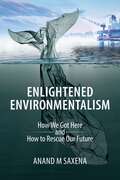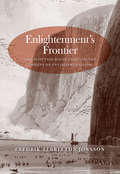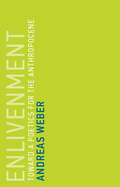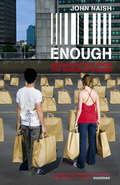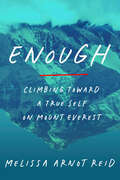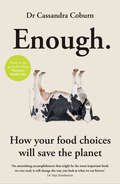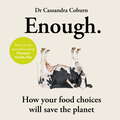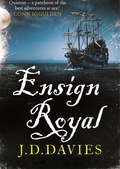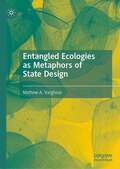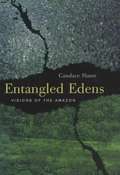- Table View
- List View
Engaging the Public with Climate Change: Behaviour Change and Communication
by Lorraine Whitmarsh Irene Lorenzoni Saffron O'NeillDespite increasing public awareness of climate change, our behaviours relating to consumption and energy use remain largely unchanged. This book answers the urgent call for effective engagement methods to foster sustainable lifestyles, community action, and social change. Written by practitioners and academics, the chapters combine theoretical perspectives with case studies and practical guidance, examining what works and what doesn't, and providing transferable lessons for future engagement approaches. Showcasing innovative thought and approaches from around the world, this book is essential reading for anyone working to foster real and lasting behavioural and social change.
Engendering Climate Change: Learnings from South Asia
by Anjal Prakash Asha Hans Nitya Rao Amrita PatelThis book focuses on the gendered experiences of environmental change across different geographies and social contexts in South Asia and on diverse strategies of adapting to climate variability. The book analyzes how changes in rainfall patterns, floods, droughts, heatwaves and landslides affect those who are directly dependent on the agrarian economy. It examines the socio-economic pressures, including the increase in women’s work burdens both in production and reproduction on gender relations. It also examines coping mechanisms such as male migration and the formation of women’s collectives which create space for agency and change in rigid social relations. The volume looks at perspectives from India, Pakistan, Bangladesh and Nepal to present the nuances of gender relations across borders along with similarities and differences across geographical,socio-cultural and policy contexts. This book will be of interest to researchers and students of sociology, development, gender, economics, environmental studies and South Asian studies. It will also be useful for policymakers, NGOs and think tanks working in the areas of gender, climate change and development.
Engineering Eden: A Violent Death, a Federal Trial, and the Struggle to Restore Nature in Our National Parks
by Jordan Fisher Smith“Weaves together a dramatic court case in Los Angeles, a grizzly-bear attack, and a surprisingly fascinating debate . . . a thrilling read.” —The Wall Street JournalWinner of the California Book Award, Silver Medal for NonfictionLonglisted for the PEN/E.O. Wilson Award for Literary Science WritingOne of Outside magazine’s 10 Outdoor Books that Shaped the Last DecadeIn the summer of 1972, twenty-five-year-old Harry Eugene Walker hitchhiked away from his family’s northern Alabama dairy farm to see America. Nineteen days later, he was killed by an endangered grizzly bear in Yellowstone National Park. The ensuing civil trial, brought against the US Department of the Interior for alleged mismanagement of the park’s grizzly population, emerged as a referendum on how America’s most beloved wild places should be conserved. Two of the twentieth century’s greatest wildlife biologists testified—on opposite sides.Moving across decades and among Yellowstone, Yosemite, Glacier, and Sequoia National Parks, former park ranger Jordan Fisher Smith has crafted an epic, emotionally wrenching account of America’s fraught, century-and-a-half-long attempt to remake Eden—in the name of saving it.“This meticulously investigated history of Yellowstone and its wildlife management problems should appeal to fans of Jack Olsen’s classic Night of the Grizzlies.” —Library Journal“A wonderful book . . . Smith uses [Walker’s death] as a narrative focal point to explore science, policy making, bureaucracy, ego, even the law, and when he explores something he goes deep.” —John M. Barry, #1 New York Times–bestselling author of The Great Influenza“First-rate storytelling.” —Seattle Times
Engineering Eden: The True Story of a Violent Death, a Trial, and the Fight over Controlling Nature
by Jordan Fisher SmithThe fascinating story of a trial that opened a window onto the century-long battle to control nature in the national parks. When twenty-five-year-old Harry Walker was killed by a bear in Yellowstone Park in 1972, the civil trial prompted by his death became a proxy for bigger questions about American wilderness management that had been boiling for a century. At immediate issue was whether the Park Service should have done more to keep bears away from humans, but what was revealed as the trial unfolded was just how fruitless our efforts to regulate nature in the parks had always been. The proceedings drew to the witness stand some of the most important figures in twentieth century wilderness management, including the eminent zoologist A. Starker Leopold, who had produced a landmark conservationist document in the 1950s, and all-American twin researchers John and Frank Craighead, who ran groundbreaking bear studies at Yellowstone. Their testimony would help decide whether the government owed the Walker family restitution for Harry's death, but it would also illuminate decades of patchwork efforts to preserve an idea of nature that had never existed in the first place. In this remarkable excavation of American environmental history, nature writer and former park ranger Jordan Fisher Smith uses Harry Walker's story to tell the larger narrative of the futile, sometimes fatal, attempts to remake wilderness in the name of preserving it. Tracing a course from the founding of the national parks through the tangled twentieth-century growth of the conservationist movement, Smith gives the lie to the portrayal of national parks as Edenic wonderlands unspoiled until the arrival of Europeans, and shows how virtually every attempt to manage nature in the parks has only created cascading effects that require even more management. Moving across time and between Yellowstone, Yosemite, and Glacier national parks, Engineering Eden shows how efforts at wilderness management have always been undone by one fundamental problem--that the idea of what is "wild" dissolves as soon as we begin to examine it, leaving us with little framework to say what wilderness should look like and which human interventions are acceptable in trying to preserve it. In the tradition of John McPhee's The Control of Nature and Alan Burdick's Out of Eden, Jordan Fisher Smith has produced a powerful work of popular science and environmental history, grappling with critical issues that we have even now yet to resolve.
Engineering Reality: The Politics of Environmental Impact Assessments and the Just Energy Transition in Colombia
by Cornelia HelmckeEngineering Reality offers unprecedented insights into the power of environmental impact assessments in engineering a reality favourable to any investment, focusing on the highly contested environmental study of a large hydroelectric dam project in southern Colombia, El Quimbo. The inclusion of environmental impact assessments to project proposals of environmental influence has been an undeniably important step to environmental governance in many countries around the world. Regarding the science behind these studies as objective and their results as the closest in representing reality, however, is misleading. Many activists and scholars made it their mission to uncover the limitations and work towards filling the gaps. Participation processes are considered key to any successful evaluation, but local knowledges and alternative perspectives are still often disqualified through more widely accepted scientific methods. Engineering Reality systematically walks through and accounts for the shortcomings and injustices associated with environmental monitoring. It compares the reality as presented in the dam’s environmental impact study with first-hand accounts from the local and affected populations and observations gathered through two periods of fieldwork in 2012 (before) and 2016-17 (after the dam started operating). It explores how the knowledge of the study was used politically and to what end. Bringing the findings in conversation with the wider environmental impact assessment literature, the book proposes a new framework to assess energy projects -Energy Data Justice- that regards the environmental impact assessment a strictly political tool aimed at reaching the just energy transition in Colombia and worldwide.
Engineering Response to Climate Change
by Robert G. WattsA clear, concise discussion of today's hottest topics in climate change, including adapting to climate change and geo-engineering to mitigate the effects of change, Engineering Response to Climate Change, Second Edition takes on the tough questions of what to do and offers real solutions to the practical problems caused by radical changes in the Ea
Engineering Vulnerability: In Pursuit of Climate Adaptation
by Sarah E. VaughnIn Engineering Vulnerability Sarah E. Vaughn examines climate adaptation against the backdrop of ongoing processes of settler colonialism and the global climate change initiatives that seek to intervene in the lives of the world’s most vulnerable. Her case study is Guyana in the aftermath of the 2005 catastrophic flooding that ravaged the country’s Atlantic coastal plain. The country’s ensuing engineering projects reveal the contingencies of climate adaptation and the capacity of flooding to shape Guyanese expectations about racial (in)equality. Analyzing the coproduction of race and vulnerability, Vaughn details why climate adaptation has implications for how we understand the past and the continued human settlement of a place. Such understandings become particularly apparent not only through experts’ and ordinary citizens’ disputes over resources but in their attention to the ethical practice of technoscience over time. Approaching climate adaptation this way, Vaughn exposes the generative openings as well as gaps in racial thinking for theorizing climate action, environmental justice, and, more broadly, future life on a warming planet.Duke University Press Scholars of Color First Book Award recipient
Engineering for Sustainable Development and Living: Preserving a Future for the Next Generation to Cherish
by Jacqueline A. Stagner David S-K. TingWhat can we do to preserve a future for the next generation to cherish? A potent answer is to exercise good stewardship in realizing more sustainable living and development. This volume brings together experts from around the world to disseminate the late
Engineering, Science, and Sustainability: Advancements in Technology and Techniques
by Dimitrios A Karras Sai Kiran Oruganti Sudeshna RayISC 2022 is dedicated to the Niti Aayog policies to promote sustainability through exchange of ideas emerging out of the academia. The ISC is an annual conference that is held in virtual mode until COVID restrictions on travel exist. The vision of the conference is to capacitate Academia with the necessary ideas that provide insights of the grassroot level development to various stakeholders of the Niti-Aayog policies. Towards this goal, the conference creates a conjunction of various stakeholders of Niti-Aayog policies that include- academic institutions, government bodies, policy makers and industry. The ISC organizers make concerted efforts to promote academic research that would technological, scientific, management & business practices, and insights into policy merits & disruptions. The framework of exchange of ideas is geared towards adoption of deep technologies, fundamental sciences & engineering, energy research, energy policies, advances in medicine & related case studies. This framework enables the round table discussions between the academia, industry and policy makers through its range of plenary and keynote speakers.
England, Our England
by Alan TitchmarshAn anthology and miscellany of everything an Englishman should know: From Austen to Wordsworth,Jerusalem to the Scout?s Honour, Kings and Queens of England to Land of Hope and Glory, Savile Row tailors to Jermyn St Shirt Makers, Tying a Windsor knot to making a pot of tea, Victoria sponge to fish pie and the rules of cricket to Gilbert and Sullivan operas
English Urban Commons: The Past, Present and Future of Green Spaces (Earthscan Studies in Natural Resource Management)
by Sarah Collins Rachel Hammersley Christopher Rodgers Emma Cheatle Olivia Dee Alessandro Zambelli John Wedgwood Clarke Siobhan O’NeillThe book presents a novel examination of urban commons which provides a robust base for education initiatives and future public policy guidance on the protection and use of urban commons as invaluable urban green spaces that offer a diverse cultural and ecological resource for future communities. The book's central argument is that only through a deep understanding of the past and a rigorous engagement with present users, can we devise new futures or imaginaries of culture, well-being and diversity for the urban commons. It argues that understanding the genesis of, and interactions between, the different pressures on urban green space has important policy implications for the delivery of nature conservation, recreational access and other land use priorities. The stakeholders in today’s urban commons, whether land users, policy makers or the public, are the inheritors of a complex cultural legacy and must negotiate diverse and sometimes conflicting objectives in their pursuit of a potentially unifying goal: a secure future for our urban commons. The book offers a unique and strongly interdisciplinary study of urban commons, one that brings together original historical investigation, contemporary legal scholarship, extensive oral history research with user groups, and research examining the imagined futures for the urban common in modern society. It explores the complex social and political history of the urban common, as well as its legal and cultural status today, using four diverse case studies from within England as exemplars of the distinctively urban common. These are Town Moor in Newcastle, Mousehold Heath in Norwich, Clifton and Durdham Downs in Bristol and Valley Gardens in Brighton. The book concludes by looking forward and considering new tools and methods of negotiation, inclusivity and creativity to inform the future of these case studies, and of urban commons more widely. This book will be of great interest to students and scholars of the commons, green spaces, urban planning, environmental and urban geography, environmental studies and natural resource management.
English Urban Commons: The Past, Present and Future of Green Spaces (ISSN)
by Sarah Collins Rachel Hammersley Christopher Rodgers Emma Cheatle Olivia Dee Alessandro Zambelli John Wedgwood Clarke Siobhan O’NeillThis book presents a novel examination of urban commons which provides a robust base for education initiatives and future public policy guidance on the protection and use of urban commons as invaluable urban green spaces that offer a diverse cultural and ecological resource for future communities.This book's central argument is that only through a deep understanding of the past and a rigorous engagement with present users can we devise new futures or imaginaries of culture, well-being and diversity for the urban commons. It argues that understanding the genesis of, and interactions between, the different pressures on urban green space has important policy implications for the delivery of nature conservation, recreational access and other land use priorities. The stakeholders in today’s urban commons, whether land users, policy makers or the public, are the inheritors of a complex cultural legacy and must negotiate diverse and sometimes conflicting objectives in their pursuit of a potentially unifying goal: a secure future for our urban commons. This book offers a unique and strongly interdisciplinary study of urban commons, one that brings together original historical investigation, contemporary legal scholarship, extensive oral history research with user groups and research examining the imagined futures for the urban common in modern society. It explores the complex social and political history of the urban common, as well as its legal and cultural status today, using four diverse case studies from within England as exemplars of the distinctively urban common. These are Town Moor in Newcastle, Mousehold Heath in Norwich, Clifton and Durdham Downs in Bristol and Valley Gardens in Brighton. This book concludes by looking forward and considering new tools and methods of negotiation, inclusivity and creativity to inform the future of these case studies, and of urban commons more widely.This book will be of great interest to students and scholars of the commons, green spaces, urban planning, environmental and urban geography, environmental studies and natural resource management.The Open Access version of this book, available at www.taylorfrancis.com, has been made available under a Creative Commons [Attribution-Non Commercial-No Derivatives (CC-BY-NC-ND)] 4.0 license.
Enhanced stabilisation of municipal solid waste in bioreactor landfills: UNESCO-IHE PhD Thesis
by Roberto Valencia VazquezMunicipal solid waste entombed in landfills will produce pollution in the form of landfill gas and leachate when the barriers fail in the long term. Bioreactor landfills are an alternative solution to avoid such negative impacts and to achieve a more stable residue, the so-called Final Storage Quality (FSQ) of residues. However, until now the main
Enlightened Environmentalism: How We Got Here and How to Rescue Our Future
by Anand M SaxenaA continuous search for comforts, conveniences, and novel objects has brought humanity to a state where a continuation of this process endangers the welfare, perhaps even survival of humanity. The present lifestyle of profligate consumption, aided by deve
Enlightenment's Frontier
by Dr Fredrik Albritton JonssonEnlightenment's Frontier is the first book to investigate the environmental roots of the Scottish Enlightenment. What was the place of the natural world in Adam Smith's famous defense of free trade? Fredrik Albritton Jonsson recovers the forgotten networks of improvers and natural historians that sought to transform the soil, plants, and climate of Scotland in the eighteenth century. The Highlands offered a vast outdoor laboratory for rival liberal and conservative views of nature and society. But when the improvement schemes foundered toward the end of the century, northern Scotland instead became a crucible for anxieties about overpopulation, resource exhaustion, and the physical limits to economic growth. In this way, the rise and fall of the Enlightenment in the Highlands sheds new light on the origins of environmentalism.
Enlivenment: Toward a Poetics for the Anthropocene (Untimely Meditations #16)
by Andreas WeberA new understanding of the Anthropocene that is based on mutual transformation with nature rather than control over nature. We have been told that we are living in the Anthropocene, a geological era shaped by humans rather than by nature. In Enlivenment, German philosopher Andreas Weber presents an alternative understanding of our relationship with nature, arguing not that humans control nature but that humans and nature exist in a commons of mutual transformation. There is no nature–human dualism, he contends, because the fundamental dimension of existence is shared in what he calls "aliveness." All subjectivity is intersubjectivity. Self is self-through-other. Seeing all beings in a common household of matter, desire, and imagination, an economy of metabolic and economic transformation, is “enlivenment.” This perspective allows us to move beyond Enlightenment-style thinking that strips material reality of any subjectivity.To take this step, Weber argues, we need to supplant the concept of techné with the concept of poiesis as the element that brings forth reality. In a world not divided into things and ideas, culture and nature, reality arises from the creation of relationships and continuous fertile transformations; any thinking in terms of relationships comes about as a poetics. The self is always a function of the whole; the whole is equally a function of the individual. Only this integrated freedom allows humanity to reconcile with the natural world.This first English edition of Enlivenment has been expanded and updated from the German edition.
Enough
by John NaishFor millions of years, humankind has used a brilliantly successful survival strategy. If we like something, we chase after more of it: more status, more food, more info, more stuff. Then we chase again. Its how we survived famine, disease and disaster to colonise the world. But now, thanks to technology, weve suddenly got more of everything than we can ever use, enjoy or afford. That doesnt stop us from striving though and its making us sick, tired, overweight, angry and in debt. It burns up our personal ecologies and the planets ecology too. We urgently need to develop a sense of enough. Our culture keeps telling us that we dont yet have all we need to be happy, but in fact we need to nurture a new skill the ability to bask in the bounties all around us. ENOUGH explores how our Neolithic brain-wiring spurs us to build a world of overabundance that keeps us hooked on more. John explains how, through adopting the art of enoughness, we can break from this wrecking cycle. With ten chapters on topics such as Enough food, Enough stuff, Enough hurry and Enough information, he explores how we created the problem and gives us practical ways to make our lives better.
Enough
by John NaishFor millions of years, humankind has used a brilliantly successful survival strategy. If we like something, we chase after more of it: more status, more food, more info, more stuff. Then we chase again. Its how we survived famine, disease and disaster to colonise the world. But now, thanks to technology, weve suddenly got more of everything than we can ever use, enjoy or afford. That doesnt stop us from striving though and its making us sick, tired, overweight, angry and in debt. It burns up our personal ecologies and the planets ecology too. We urgently need to develop a sense of enough. Our culture keeps telling us that we dont yet have all we need to be happy, but in fact we need to nurture a new skill the ability to bask in the bounties all around us. ENOUGH explores how our Neolithic brain-wiring spurs us to build a world of overabundance that keeps us hooked on more. John explains how, through adopting the art of enoughness, we can break from this wrecking cycle. With ten chapters on topics such as Enough food, Enough stuff, Enough hurry and Enough information, he explores how we created the problem and gives us practical ways to make our lives better.
Enough: Climbing Toward a True Self on Mount Everest
by Melissa Arnot ReidA searching, uplifting memoir by the celebrated, groundbreaking climber: a journey of overcoming where the mountain&’s highest peaks can only be reached by traversing the dark crevasses of the soulAt twenty-seven, when Melissa Arnot Reid accepted a tank of oxygen just short of the summit of Mount Everest, she felt ravaged by defeat. Driven by a relentless, lifelong quest to prove to herself, her family, and the world that she was enough, she had set herself an incredible goal—to become the first American woman to summit Everest without supplemental oxygen. The failure battered her spirit and left her struggling to keep her tenuous grip on hope.In the candid and adventurous spirit of Cheryl Strayed&’s Wild, Enough is a story of a life in which the most dangerous mountain faces became a refuge—until suddenly they, too, no longer seemed safe. From a childhood marked by conflict, betrayal, and predation, Reid propelled herself to the top of the mountain climbing world, summiting and guiding on the world&’s most challenging peaks and establishing herself as a woman unafraid to throw elbows in a milieu dominated by men. And yet for every summit she reached, her valleys of inner turmoil—over her estrangement with the family she believed she&’d destroyed as a child; over relationships that cycled through deception and infidelity—grew deeper and more self-destructive. Eventually, she could not keep these worlds from colliding, especially after a series of tragedies at dangerous elevations took the lives of her mentors and friends. Forced at last to face herself, Reid made her most perilous climb yet—toward the uncertain promise of forgiveness and self-acceptance.A beautiful, aching memoir of a journey with life-and-death stakes on the mountain and off, Enough bares the soul of one of the world&’s greatest climbers, from the rarified heights visible only at thin-air altitudes to the dark depths home to demons familiar to anyone who has struggled to find compassion for themselves.
Enough: How your food choices will save the planet
by Dr Cassandra Coburn***'An astonishing accomplishment that might be the most important book we ever read, it will change the way you look at what we eat forever.' - Dr Max Pemberton'A wonderfully written guide for anyone who wants to eat better and save the world at the same time. Essential reading for anyone who cares about the planet.' - Thomasina MiersHow changing what you eat can save the planetOur food production systems are the single biggest cause of environmental change, while diseases linked to our eating habits are at epidemic levels and increasing. Enough. uses the latest scientific research to address this vital question: can we provide a growing population with a healthy diet from sustainable food systems? Fortunately for us all, the answer is yes. Enough. shows exactly how we can tackle both of these urgent, interconnected challenges at the same time. Using a seminal piece of research published in 2019, the Planetary HealthDiet (PHD), Dr Coburn reveals the hidden consequences of our food choices, and how we can easily make changes which are better for ourselves and the planet. She details which food groups we should be eating, which we should avoid - and why. Changing our way of eating is something that every one of us has the power to do. Enough. is a clear, ultimately hopeful and hugely important roadmap for both own health - and the planet's.
Enough: How your food choices will save the planet
by Dr Cassandra Coburn***'An astonishing accomplishment that might be the most important book we ever read, it will change the way you look at what we eat forever.' - Dr Max Pemberton'A wonderfully written guide for anyone who wants to eat better and save the world at the same time. Essential reading for anyone who cares about the planet.' - Thomasina MiersHow changing what you eat can save the planetOur food production systems are the single biggest cause of environmental change, while diseases linked to our eating habits are at epidemic levels and increasing. Enough. uses the latest scientific research to address this vital question: can we provide a growing population with a healthy diet from sustainable food systems? Fortunately for us all, the answer is yes.Enough. shows exactly how we can tackle both of these urgent, interconnected challenges at the same time. Using a seminal piece of research published in 2019, the Planetary HealthDiet (PHD), Dr Coburn reveals the hidden consequences of our food choices, and how we can easily make changes which are better for ourselves and the planet. She details which food groups we should be eating, which we should avoid - and why. Changing our way of eating is something that every one of us has the power to do. Enough. is a clear, ultimately hopeful and hugely important roadmap for both own health - and the planet's.
Enough: How your food choices will save the planet
by Dr Cassandra CoburnWe produce and eat unhealthy food, killing ourselves and the planet in the process. Food production systems are the single biggest cause of environmental change to the planet. And the food we are producing is killing us - more than a quarter of the world's population is overweight or obese, and deaths from stroke, heart attack, cancer, diabetes etc are at epidemic levels. It's easy to feel helpless. In 2019 a seminal piece of research was published which, for the first time, made clear recommendations for a way to produce food and to eat that would save both the planet's resources and our own health. The Planetary Health Diet was the culmination of years of research by 37 eminent scientists of various backgrounds into this question - can we provide a growing population with a healthy diet from sustainable food systems? The answer is yes. Enough is a practical explanation of the Planetary Health Diet's research, allowing everyone to understand the science and to adopt its recommendations in our daily lives. The PHD specifies the food groups we should be eating. But what does a diet composed of, for example, 30% carbohydrates really look like? Which carbs, exactly? The diet is largely plant-based but does encompass meat and fish - but how many servings? It also explains what the nine 'planetary boundaries' are, that our food production systems must not exceed - from the quantities of nitrogen and phosphorus in the ecosystem to freshwater use. As a scientist and journalist Dr Cassandra Coburn is brilliantly placed to provide this clear, ultimately hopeful and hugely important roadmap for own future health, and that of the planet. (p) 2021 Octopus Publishing Group
Ensign Royal (The Matthew Quinton Journals)
by J. D. DaviesPart of an &“excellent series,&” this prequel reveals a British military man&’s first battles in support of the Crown Jewels in seventeenth-century England (Publishers Weekly). Matthew Quinton, eighteen years old and an ensign in the Royalist Army in Exile, is sent by his older brother the Earl of Ravensden into the heart of Oliver Cromwell&’s England. Surrounded by enemies, he soon becomes tangled in a dark web of conspiracy . . . Before long Quinton will have his first bloody taste of war, in the Battle of the Dunes, June 1658. In the battle Roundheads and royalists will fight one another one final time . . .Ensign Royal is a thrilling prequel to the Matthew Quinton Journals series of nautical sagas. Praise for the writing of J. D. Davies: &“Hornblower, Aubrey and Quinton—a pantheon of the best adventures at sea!&” —Conn Iggulden, #1 New York Times–bestselling author of The Conqueror and War of the Roses series &“A hero worth rooting for.&” —Publishers Weekly &“Utterly impossible to put down . . . Finely-shaded characters, excellent plotting, gut-clenching action and immaculate attention to period detail . . . Superb.&” —Angus Donald, author of The Outlaw Chronicles series &“Destined to be a classic of nautical adventure series.&” —Eric Jay Dolin, author of Leviathan and Fur, Fortune, and Empire &“A naval adventure that goes well beyond the usual outlines of the genre to paint a lively portrait of England in the 1600s.&” —Kirkus Reviews
Entangled Ecologies as Metaphors of State Design
by Mathew A. VargheseThis book takes a unique approach to the ethnographic and analytical explorations of ecologies in the making. The core theme of the work will be the emerging anthropocene contexts that simultaneously bring unprecedented human interactions with the non-human as well as the emergence of hybrid ecologies. There will be dependence on existing literature, own ethnographic work that has already went into this, the closer introspection of immediate geographies as well as the pertinent debates. There has been a reconfiguration of meaning and nature of spaces in the context of social relations produced by neo-liberal globalization. States as they have been are transforming and are influenced by policies made beyond borders. This work is marked out by careful enquiry on ecologies in the making with the backdrop of distinct regional developmentalist trajectories as well as specific ethnography from Kerala, South-West India.
Entangled Edens: Visions of the Amazon
by Candace SlaterStories and writings about the Amazon, by insiders (Indians, miners) and outsiders (explorers, scientists). Slater argues that these tales, examined together, show us an Amazon much more complex than "Save the Rain Forest" slogans--a vision that will allow us to save the Amazon in all its human and biological diversity.
